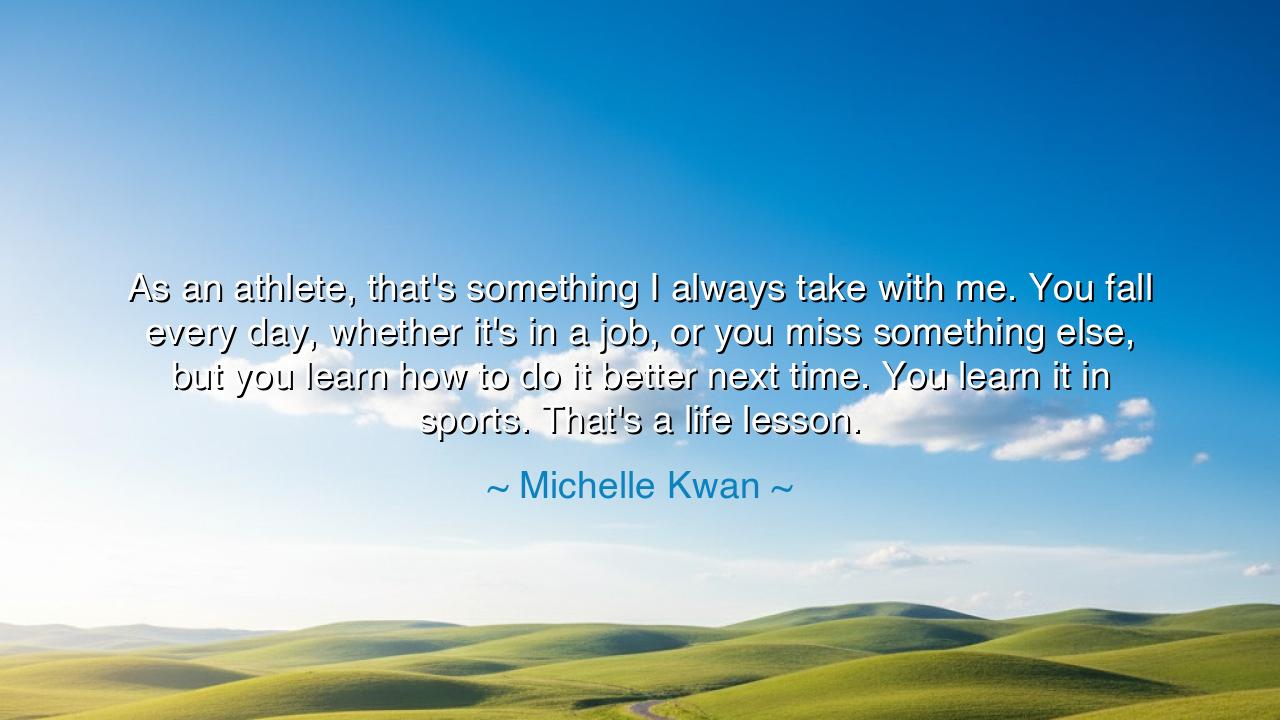
As an athlete, that's something I always take with me. You fall
As an athlete, that's something I always take with me. You fall every day, whether it's in a job, or you miss something else, but you learn how to do it better next time. You learn it in sports. That's a life lesson.






The words of Michelle Kwan—“As an athlete, that's something I always take with me. You fall every day, whether it's in a job, or you miss something else, but you learn how to do it better next time. You learn it in sports. That's a life lesson.”—are a torch of wisdom, forged from the fire of experience. They remind us that failure is not the end, but the teacher. The fall is not the defeat, but the beginning of strength. For in the arena of sport, as in the arena of life, the body stumbles, the spirit falters, but the will, when disciplined, learns to rise again.
Her words begin with the simplest truth of all: you fall every day. This is the human condition. In small ways and in great, we stumble—on the ice, on the field, in our labor, in our relationships, in our striving toward dreams. The ancients never pretended otherwise. They spoke of men as fragile vessels, as wanderers who learn by error. What sets apart the strong from the weak is not the absence of failure, but the courage to rise, to adjust, to “do it better next time.”
Sports, Kwan tells us, are a training ground for this eternal rhythm of fall and rise. In her own craft—figure skating—the fall is not symbolic, but literal. One wrong turn, one hesitation, and the body crashes to the ice. Yet the skater does not remain there. She rises, steadies herself, and tries again, until the movement flows with grace. This, she reminds us, is the life lesson hidden in sport: the rehearsal of resilience, the practice of perseverance, the sacred art of rising after the fall.
History gives us countless witnesses to this truth. Consider Thomas Edison, who, in his quest to bring light to the world, endured a thousand failed experiments. When asked about his failures, he replied, “I have not failed. I’ve just found ten thousand ways that won’t work.” His life was no different than the athlete’s training: each fall was a lesson, each mistake a stepping stone, each stumble the seed of victory. He learned, as Kwan learned, that falling is not shame but growth.
The emotional power of Kwan’s words lies in their universality. The child falling from a bicycle, the worker passed over for promotion, the parent struggling with mistakes—all know the pain of imperfection. Yet when they hear these words, they are reminded that even champions fall, that even the great are shaped by failure. It is not perfection that makes a life heroic, but the willingness to rise with humility and resolve after every fall.
For the seeker of wisdom, the lesson is luminous: cultivate resilience. Do not curse the fall, for it is your teacher. Do not despair when you miss the mark, for the very missing sharpens your aim for the next attempt. Remember that sports mirror life because both are built upon the same foundation: practice, error, adjustment, persistence. The one who endures, who learns, who adapts, will outlast the one who seeks only easy triumphs.
What then must we do? Embrace the falls. When you stumble at work, in love, in learning, do not bury yourself in shame—ask instead, “What must I learn here?” Begin again with stronger hands, a clearer mind, and a braver heart. Let each failure become a rung on the ladder, lifting you higher than before. And when you witness another fall, do not mock them, but encourage them, for their fall today may be the foundation of tomorrow’s greatness.
Thus, Michelle Kwan’s words echo like the wisdom of the ancients: to fall is human, but to rise is divine. Life itself is a training ground, each stumble an instructor, each mistake a step forward. Take this lesson with you always: that the fall is never the end, but the beginning of wisdom, the forge of character, and the path to triumph.






AAdministratorAdministrator
Welcome, honored guests. Please leave a comment, we will respond soon